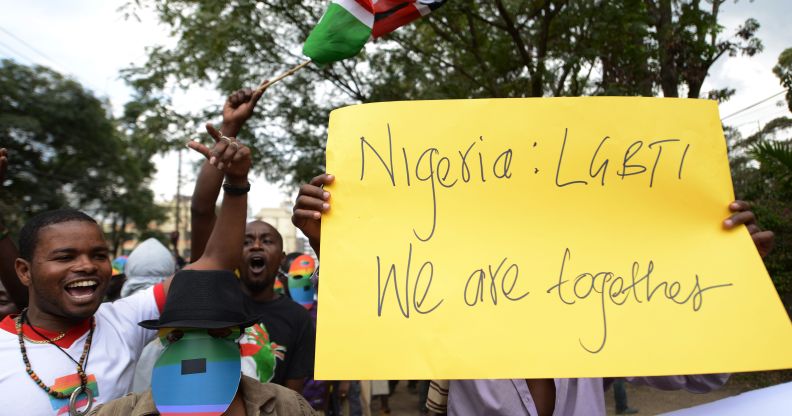Judge throws out case of 47 Nigerian men accused of gay sex after prosecutors fail to even show up

LGBTQ+ groups demonstrate outside the Nigerian High Commission in Nairobi. (SIMON MAINA/AFP/ Getty)
A Nigerian judge threw out a case against 47 men accused of gay sex after the prosecutors failed to show up in court or call any witnesses.
The high-profile case was widely seen as a test of the country’s same-sex marriage prohibition act (SSMPA), which punishes homosexual relationships by up to 14 years in prison.
The men were arrested in a raid on a Lagos hotel in 2018. Police claimed they were being “initiated” into a gay club, but the men insisted it was just a birthday party.
Despite all 47 of the accused pleading innocence, a day after their arrest they were publicly identified by police in a televised news conference. The media attention caused the men to be heavily stigmatised in the two years leading up to the trial.
Their ordeal finally ended on Tuesday (October 27), when justice Rilwan Aikawa struck out the case due to the “lack of diligent prosecution”.
Prosecutors didn’t even bring themselves to attend the hearing at the Federal High Court in Lagos, having previously failed to present witnesses in a case that had been adjourned on several occasions.
Emmanuel Sadi of the Initiative for Equal Rights said the outcome of the case raised questions about the law used to charge the men.
“You can’t even build a case around it,” he told Aljazeera. “I hope [the government] realise how redundant it is as a law, and they are open to removing or repealing it.”
The SSMPA was passed by former Nigerian president Goodluck Jonathan in 2014. In addition to banning same-sex relationships, it also makes a person who “registers, operates or participates in gay clubs, societies and organisation, or directly or indirectly make public show of same-sex amorous relationship” liable for 10 years in prison.
Prosecution and defence lawyers told Reuters that nobody has yet been convicted under the law, which led to the trial being viewed as a test case that could help to establish the burden of proof.
While the men celebrated the case’s dismissal, they must still live with the stigma it caused. One of the defendants, Chris Agiriga, said the judgement would not help him reconcile with his family who had rejected him over the matter.
“Since the past two years, this has caused a lot of damage in my life,” he said.

